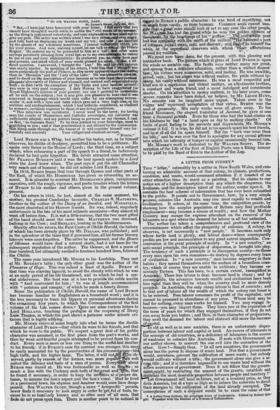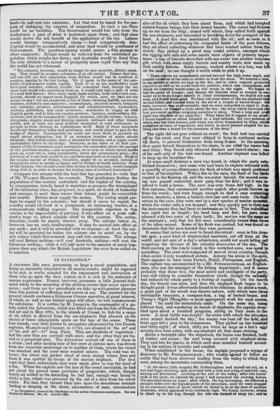A LETTER FROM SYDNEY.* .
Tins ." letter," ostensibly by a settler in New 'South Wales, and con- taining-an admirable 1-account of that colony, its 41iinate, productions, condition, -and wants, would command attention if it boasted of no other attraction than its merit as a painting. But its claims t6 our noticeare of aligher description than any which the eloquence, the liveliness, and the descriptive talent of the author,'confer upon it. It contains the best Scheme of colonization that has ever been submitted to the public. It points - out to Government, how, by a very simple process; colonies like Australia. may rise most rapidly to wealth and civilization. It solves,- at the same time, the emigration puzzle, by showing how- the surplus population of Britain may find profitable :employment—may become a source of wealth ; and how the Mother Qountry. may escape the expense attendant on the removal of the labourers to a spot where the demand for labour is all but unlimited. • The author has taken a comprehensive and profound view of the circiunstances which affect the prosperity of colonies. • A colony, he i observes, s not necessarily a "new people." It becomes such only where fertile land' is plenty,- and labour dear—where Consequently profits-are low, and accumulation to any great extent impossible. Con- centration is the great principle Of society. In "a new country," an anti-social Principle, the principle of dispersion, is brought into play. The tendency of such a principle is to disorganize society-4o throw every niak upon his own resources—to destroy by degrees every trace of civilization. In" a new country," men become migratory-in their habits ; they spread themselves over the surface of a boundless coun- try, which, of course they are unable to cultivate ; they become es- sentiallyjartars, - This has been, to a certain extent, exemplified in Amerte4•gTfiere free labour is dear, because land is cheap ; and by conseq4nce, the advances towards wealth and civilization have been less raid than they will be when the country shall be more densely peopted:t In Australia, the only cheap labour is that of convicts ; and to that sort 9f labour all the wealth of which the colony•can boast is to be referred. Free labour consumes the profit of the capitalist, and cannot be procured in abundance at any price. Where land may be had for nothing, every man works for himself. You may engage la- bourers—you may import them. They leave you at the expiration Of the term of years for which they engaged themselves, if they do not run away from you before ; and then, in their character,of proprietors, they swell the:demand for labour and obstruct still more the increase Of pital. .
. n old is well as in new societies, there is an unfortunate dispro- portion between labour and capital or land. An excess of labourers is the scourge ' of old countries, as a deficiency of labourers is the source of weakness in colonies like Australia It rests with Government, as our author shows, to 'convert the one evil into the corrective of the other. How ?—SimplY thus. "In all new countries, the government alone has thepower AO dispose Of waste land. 'Not that a-government would, anywhere, prevent . the 'cultivation of mere waste ; but nobody would cultivate without, a title ;.: the government alone can give a se- c title and it is therefore impossible to use waste land without the ae ve assistance of government. Does it not f011ow that the govern- nienknaight.;by restricting .tire amount- of the grants, establish and maintkui the, mos(desitable proportion between people and territory ?" at Gdverfinieritlelt. land inlattire, nolat a nominal price, as they do iii America; but at irate so high as thinduce the colonists to direct their energies' ti5,. the,Ciayatioii. of the:land' already- occupied. The consequence of 'such tile-ail:ire' would; be. to raise the value of that * A Letter from Sydney, the principal-town of Anstralasia• Edited 14 Robert Cr.o. get: TOgether-with the Outline of a Systeiri of Corozgzation. ••• . . • land—tó call rent into existence. Let that rent be taxed for the pur- pose of defraying the expense of emigration. In such a tax there could be no hardship. The Government would but take from the landowners a part of what it bestowed upon them ; and that class would derive the full benefit of the application of the tax. Lebour would become comparatively cheap land comparatively dear. Capital would be accumulated, and more land would be purchased of Government. The purchase-money would secure a free passage to other emigrants. Britain would be relieved from the redundant po- pulation which weighs her down ; and Australia would be freed from the only obstacle to a career of prosperity more rapid than any that the world has yet witnessed.
"The colonies, however, would no longer be new societies, strictly speak- .ing. They would he so many extensions of an old society. Pursue that idea, and you will see that emigration from Britain would not be confined to paupers, passing by the free bridge. We (I speak in the name of the colo- nists) should acquire wealth rapidly. Such of us as are landholders must have good incomes, without trouble : for remember that, though the tax upon rent would take something from us, it would only take a part of what it would first bestow ! How many ready-made articles, both useful and orna- mental, should we import from England, for which, now, we have not the • means to pay ? Let me enumerate a few of them-,-farming bailiffs, snrveyors, builders, architects and engineers ; minerahrists, practical miners, botanists and chemists ; printers, schoolmasters and schoolmistresses, booksellers, authors, publishers, and even reviewers ; merchants to supply us with English goods, and to take our surplus produce ; bankers, underwriters,life- insurers, and clerks innumerable ; actors, surgeons, and physicians ; lawyers, clergymen, singers, music and dancing masters, milliners and other female artists, and at least one rood political economist at each settlement, to prevent us from devising an Australasian tariff. Most of these emigrants would call themselves ladies and gentlemen, and would object to pass by the bridge of charity. Consequently we could not force them to preserve an
• equal sexual proportion ; but if an excessive number of males should emigrate, they would create, here, a demand for females, and a supply would , immediately follow by the bridge. Moreover, as the value of all land pur- chased of the Government must necessarily rise somewhat above the amonot of the purchase-money,—and as portions, on or near to_ where towns would grow up, must rise in value considerably above the government price,—the purchase of waste land would be an excellent employment of capital. MuCli of
• the surplus capital of Britain, therefore, might be so invested, instead of being given away to monks in Spain, and to Tartars in South America. Some of the persons, who should invest their money in this manner, would emigrate along wills it, in order to become the leading men of civilized Australasia."
Compare this scheme with the best that has preceded it—with that of Mr. WILMOT HORTON, for example. That gentleman, finding the population of this country redundant, and the capital of the country, by consequence, heavily taxed to maintain as paupers the rinemployed of the labouring class, has proposed, in a spirit, no doubt, of humanity • and courage, to send them where their labour might be convertible • into wealth. Britain must supply the means. The outlay might per- haps be repaid by the colonists ; but should it never be repaid, the country would rid itself of a, permanent, an increasing burden, at a comparatively trifling expense. The insuperable objection to this scheme is the impossibility of carrying it into effect on a scale suffi- ciently large to afford sensible relief to this country. The outlay, therefore, would be merely thrown away. The scheme before us, however, has no such disadvantage. It may be carried into effect on any scale ; and it will be attended with no expense—at least the out- lay will be provided for before the scheme can be acted on, by the new values which Government may call into existence. The scheme. will cost Britain nothing—will cost Australia nothing—will cost the labourers nothing ; while it will add more to the amount of social haps piness than any which the British Legislature has ever been called on to sanction.



















 Previous page
Previous page